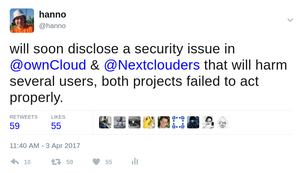
A while ago I wanted to
report a bug in one of Nextcloud's apps. They use the Github issue tracker, after creating a new issue I was welcomed with a long list of things they wanted to know about my installation. I filled the info to the best of my knowledge, until I was asked for this:
The content of config/config.php:
Which made me stop and wonder: The config file probably contains sensitive information like passwords. I quickly checked, and yes it does. It depends on the configuration of your Nextcloud installation, but in many cases the configuration contains variables for the database password (dbpassword), the smtp mail server password (mail_smtppassword) or both. Combined with other information from the config file (e. g. it also contains the smtp hostname) this could be very valuable information for an attacker.
A few lines later the bug reporting template has a warning (“Without the database password, passwordsalt and secret”), though this is incomplete, as it doesn't mention the smtp password. It also provides an alternative way of getting the content of the config file via the command line.
However... you know, this is the Internet. People don't read the fineprint. If you ask them to paste the content of their config file they might just do it.
User's passwords publicly accessible
The issues on github are all public and the URLs are of a very simple form and numbered (e. g. https://github.com/nextcloud/calendar/issues/[number]), so downloading all issues from a project is trivial. Thus with a quick check I could confirm that some users indeed posted real looking passwords to the bug tracker.
Nextcoud is a fork of Owncloud, so I checked that as well. The
bug reporting template contained exactly the same words, probably Nextcloud just copied it over when they forked. So I reported the issue to both
Owncloud and
Nextcloud via their HackerOne bug bounty programs. That was in January.
I proposed that both projects should go through their past bug reports and remove everything that looks like a password or another sensitive value. I also said that I think asking for the content of the configuration file is inherently dangerous and should be avoided. To allow users to share configuration options in a safe way I proposed to offer an option similar to the command line tool (which may not be available or usable for all users) in the web interface.
The reaction wasn't overwhelming. Apart from confirming that both projects acknowledged the problem nothing happened for quite a while. During FOSDEM I reached out to members of both projects and discussed the issue in person. Shortly after that I announced that I intended to disclose this issue three months after the initial report.
Disclosure deadline was nearing with passwords still public
The deadline was nearing and I didn't receive any report on any actions being taken by Owncloud or Nextcloud. I sent out
this tweet which received quite some attention (and I'm sorry that some people got worried about a vulnerability in Owncloud/Nextcloud itself, I got a couple of questions):

In all fairness to NextCloud, they had actually started scrubbing data from the existing bug reports, they just hadn't informed me. After the tweet Nextcloud gave me an update and Owncloud asked for a one week extension of the disclosure deadline which I agreed to.
The outcome by now isn't ideal. Both projects have scrubbed all obvious passwords from existing bug reports, although I still find values where it's not entirely clear whether they are replacement values or just very bad passwords (e. g. things like “123456”, but you might argue that people using such passwords have other problems).
Nextcloud has changed the wording of the bug reporting template. The new template still asks for the config file, but it mentions the safer command line option first and has the warning closer to the mentioning of the config. This is still far from ideal and I wouldn't be surprised if people continue pasting their passwords. However Nextcloud developers have indicated in the HackerOne discussion that they might pick up my idea of offering a GUI version to export a scrubbed config file. Owncloud has changed nothing yet.
If you have reported bugs to Owncloud or Nextcloud in the past and are unsure whether you may have pasted your password it's probably best to change it. Even if it's been removed now it may still be available within search engine caches or it might have already been recorded by an attacker.
 A while ago I wanted to
A while ago I wanted to 